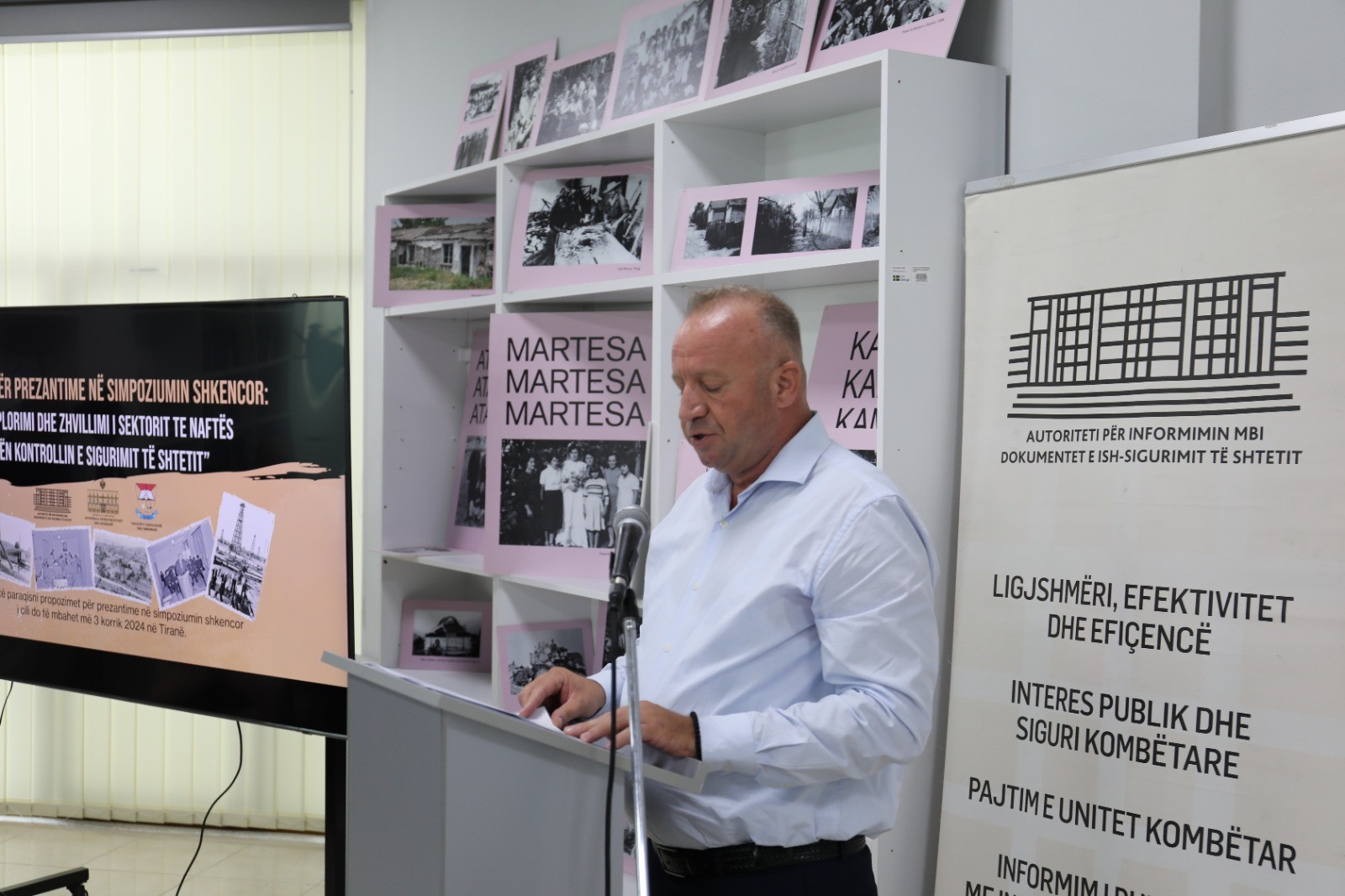
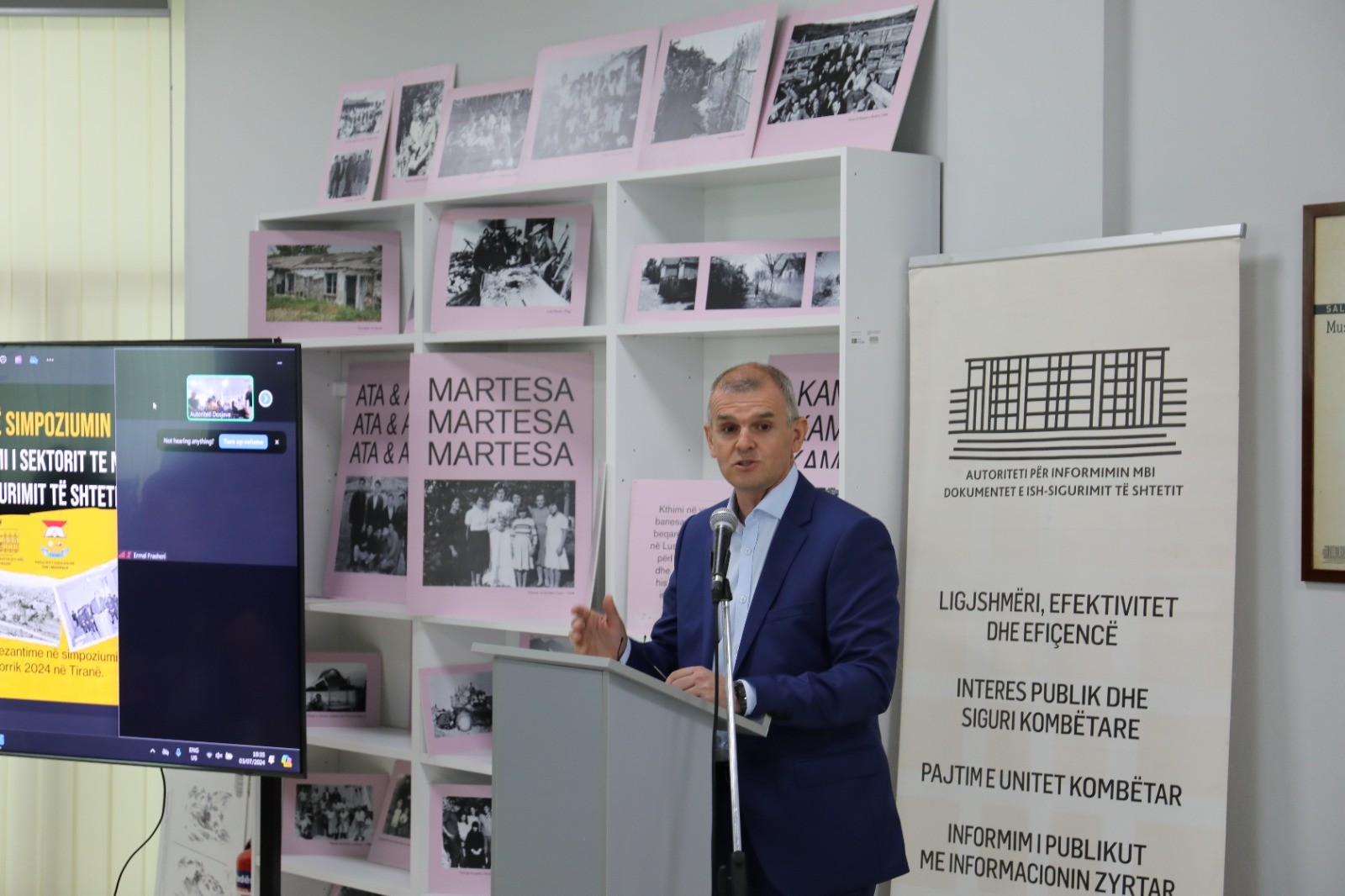
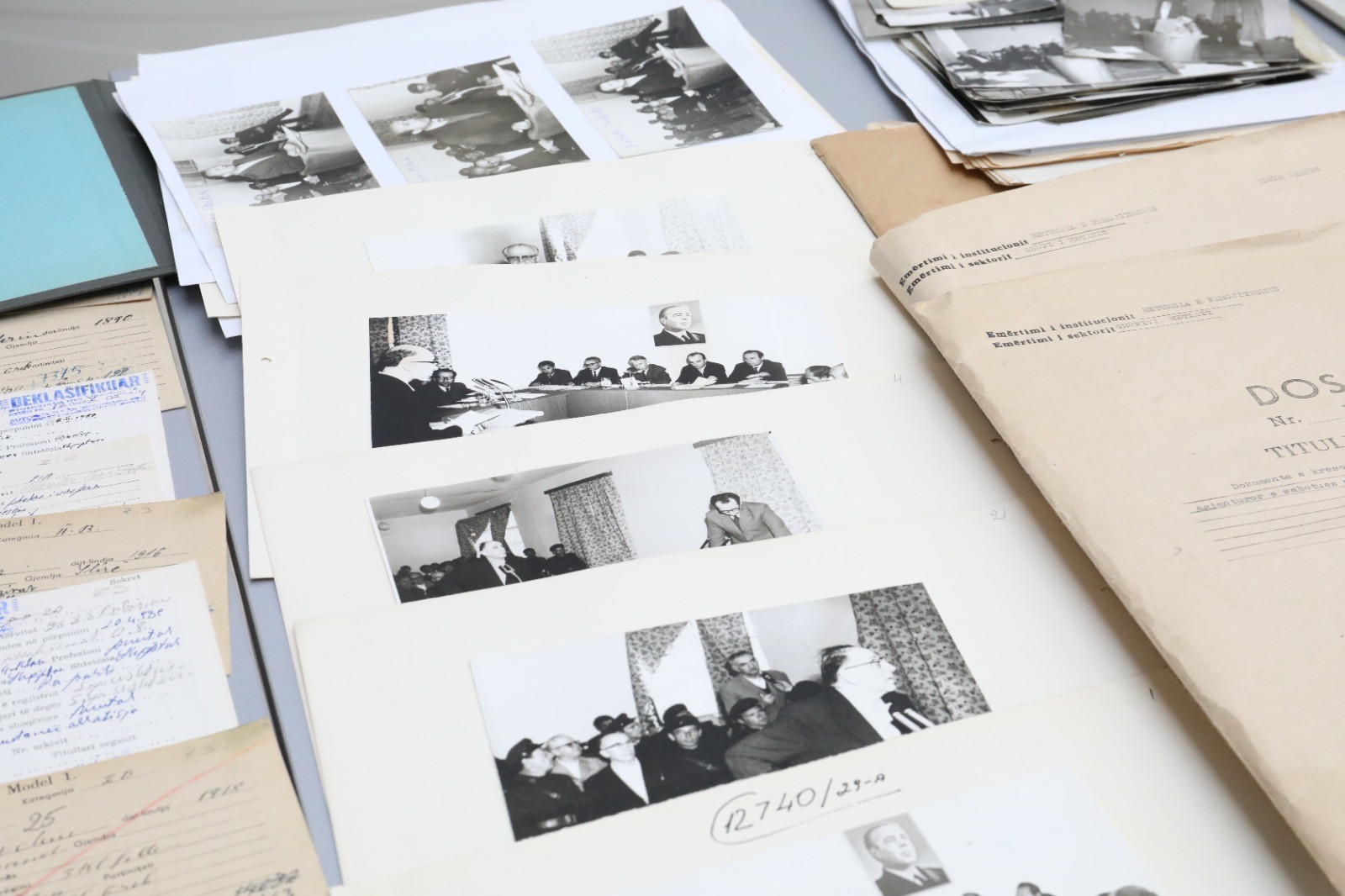
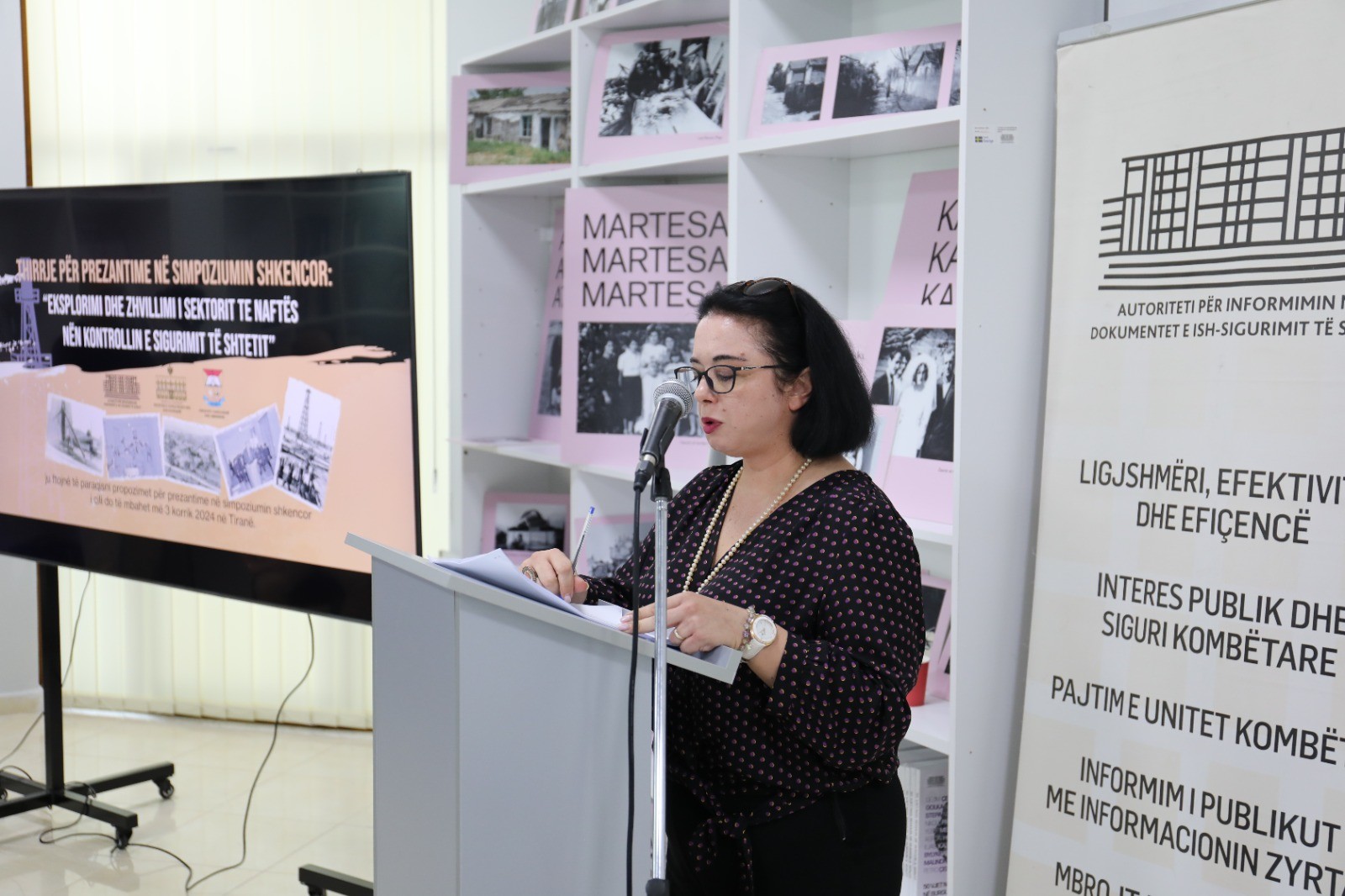
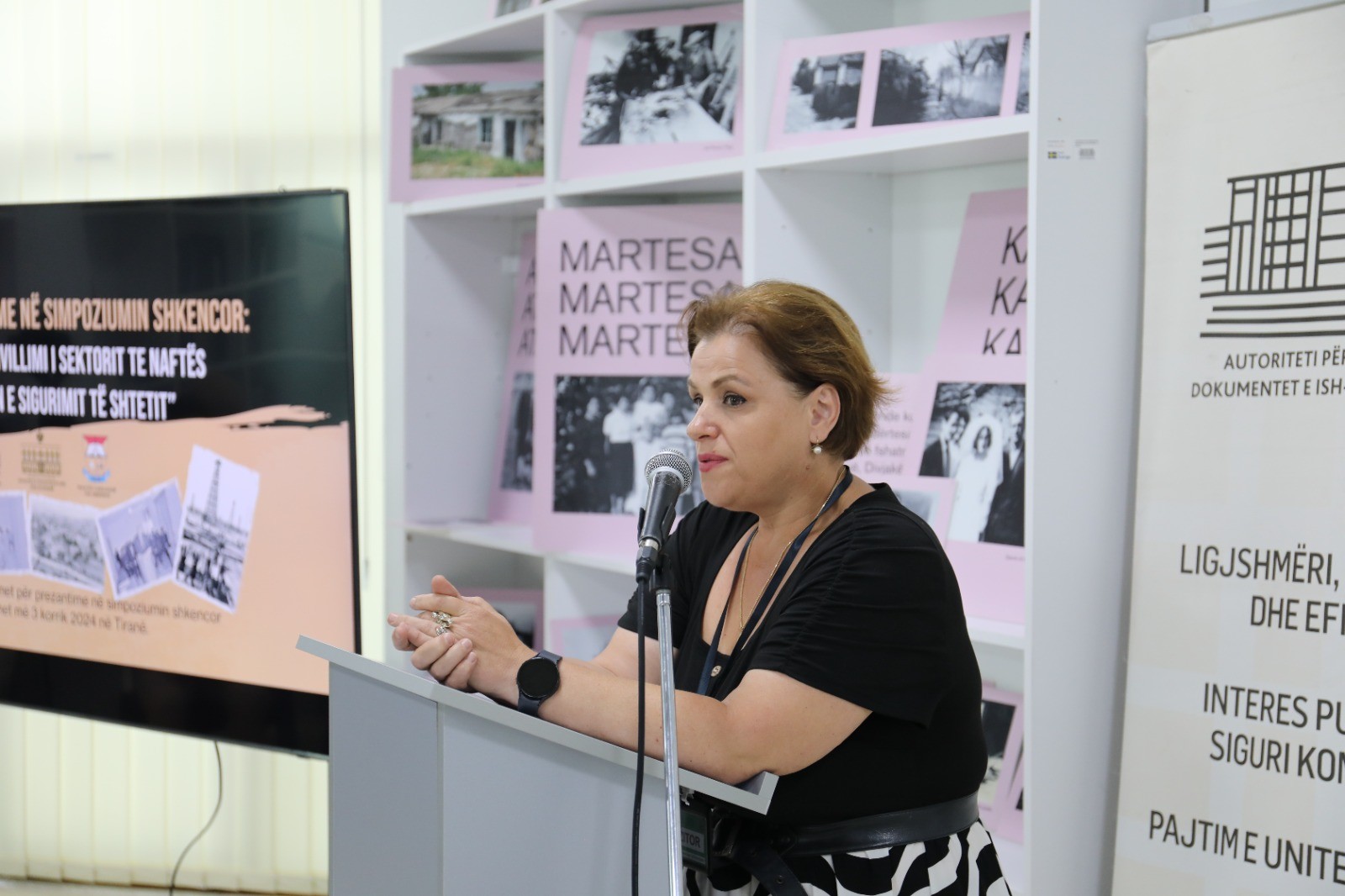
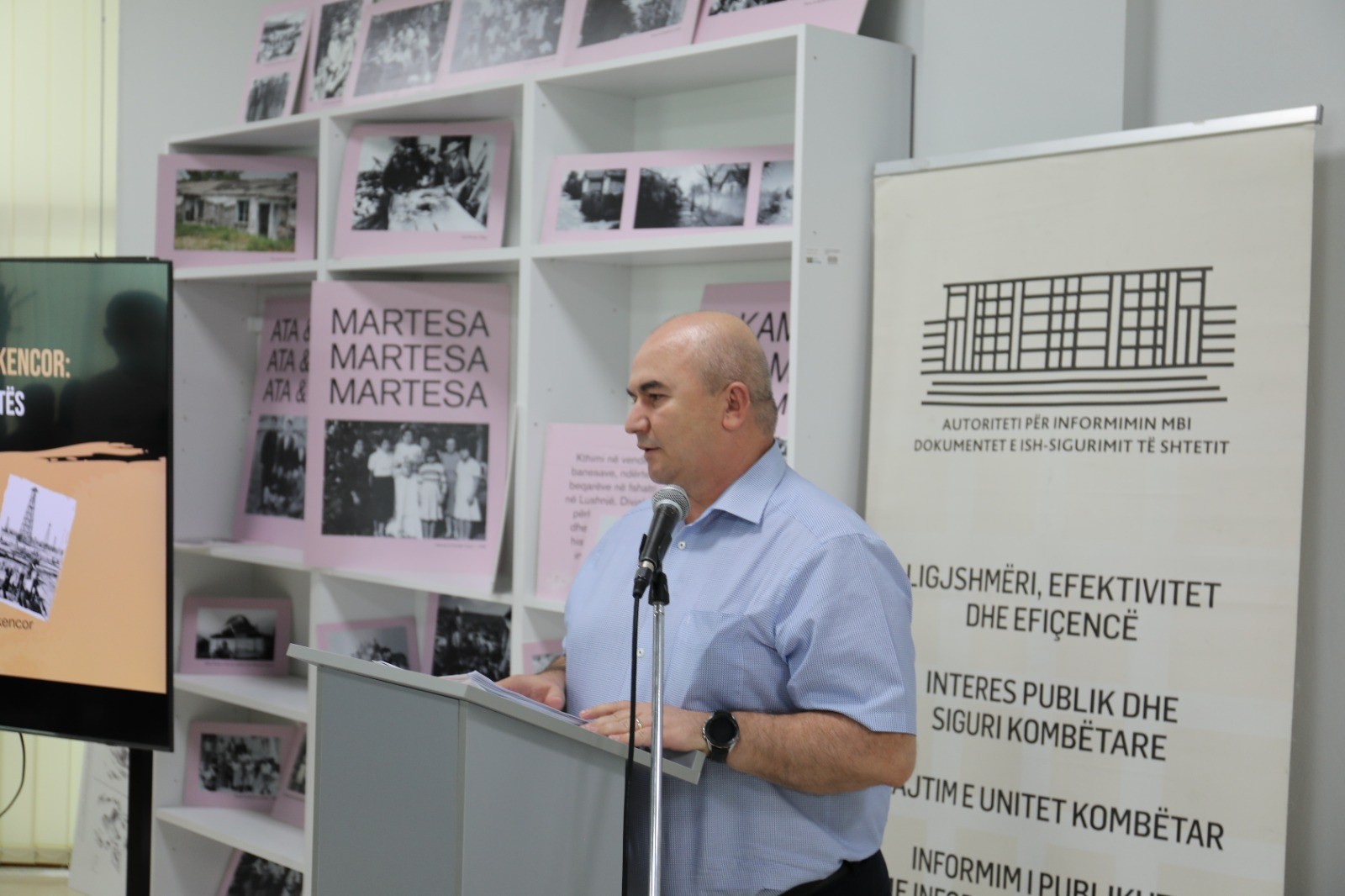
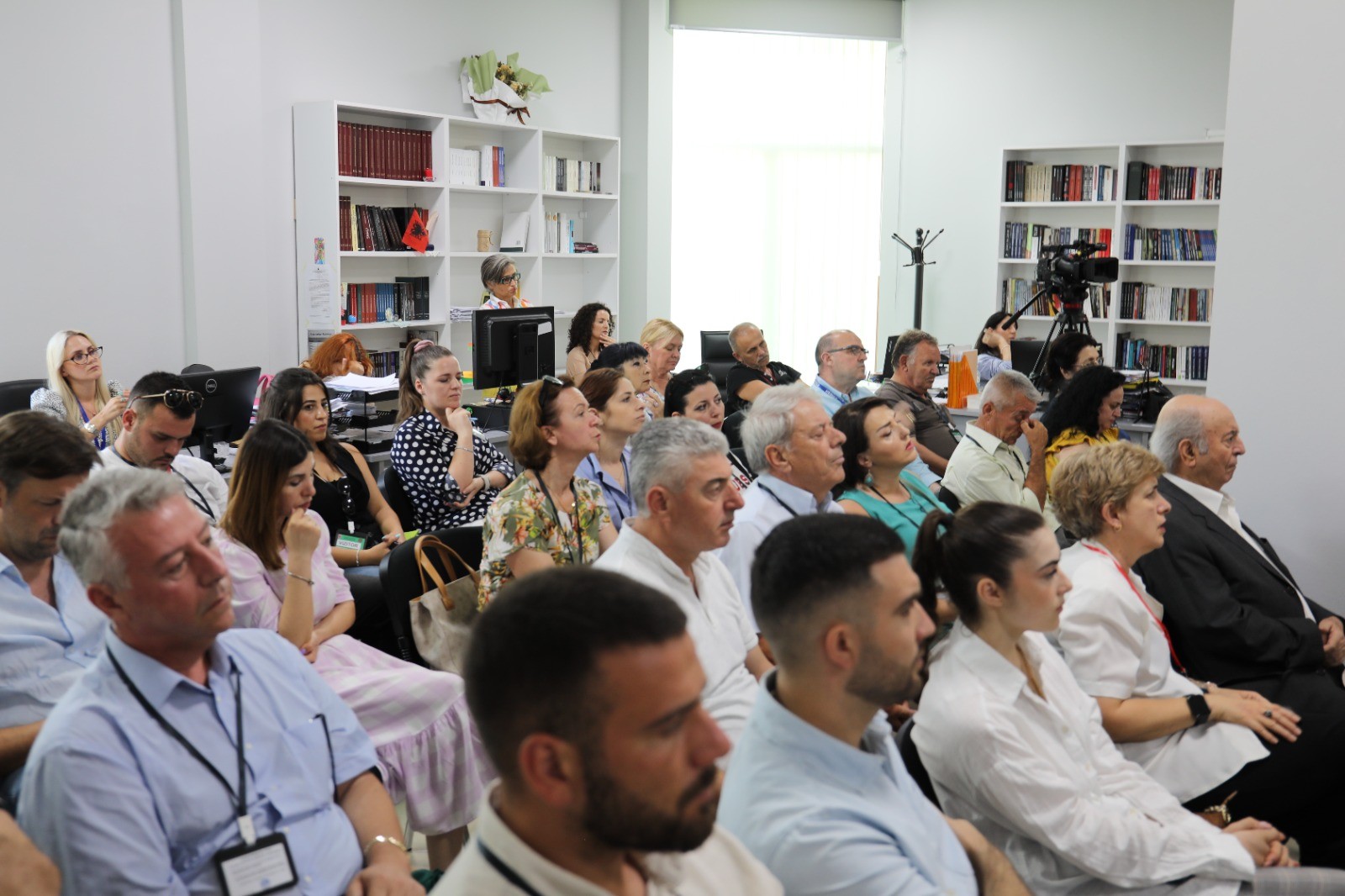
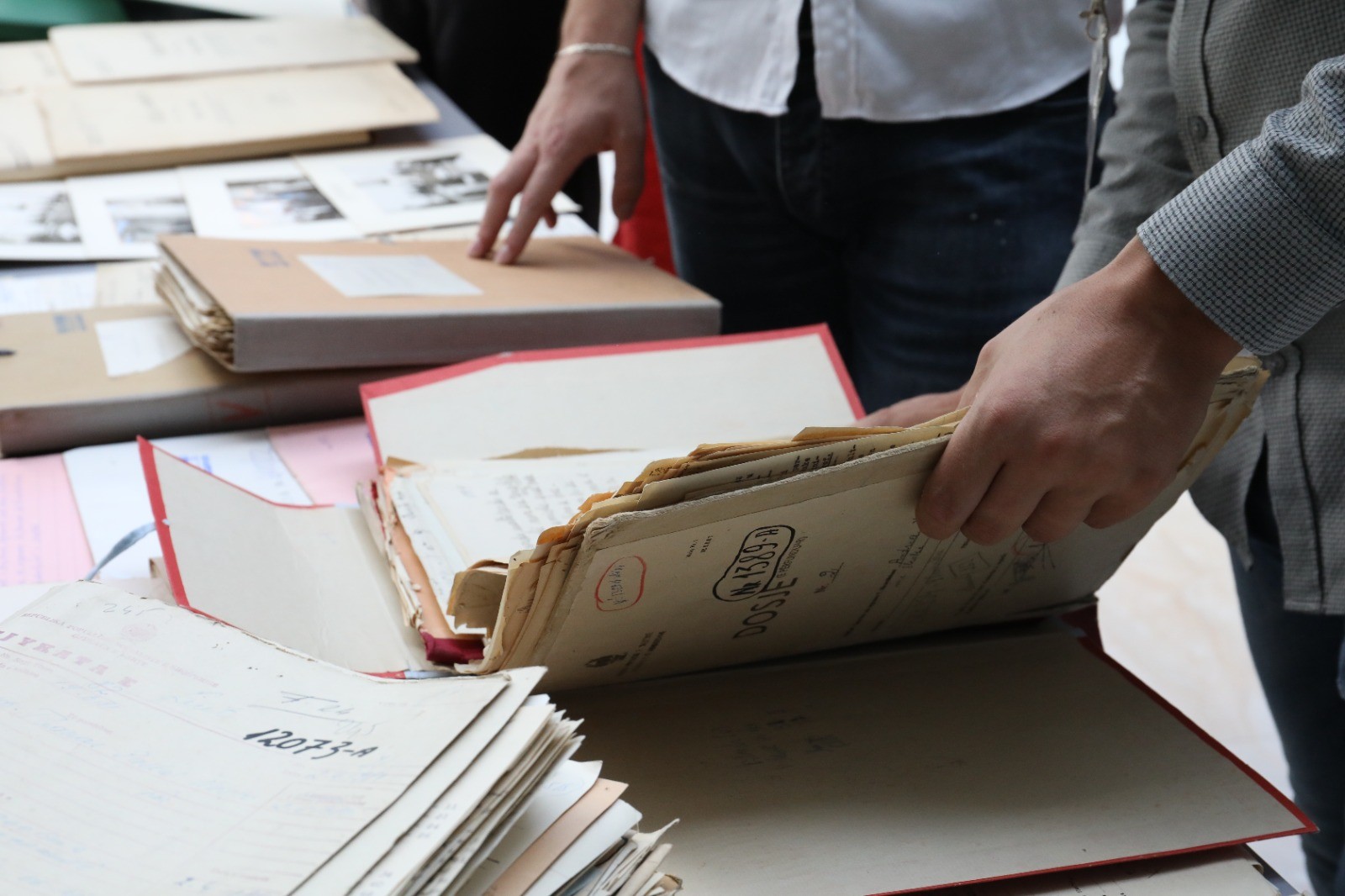
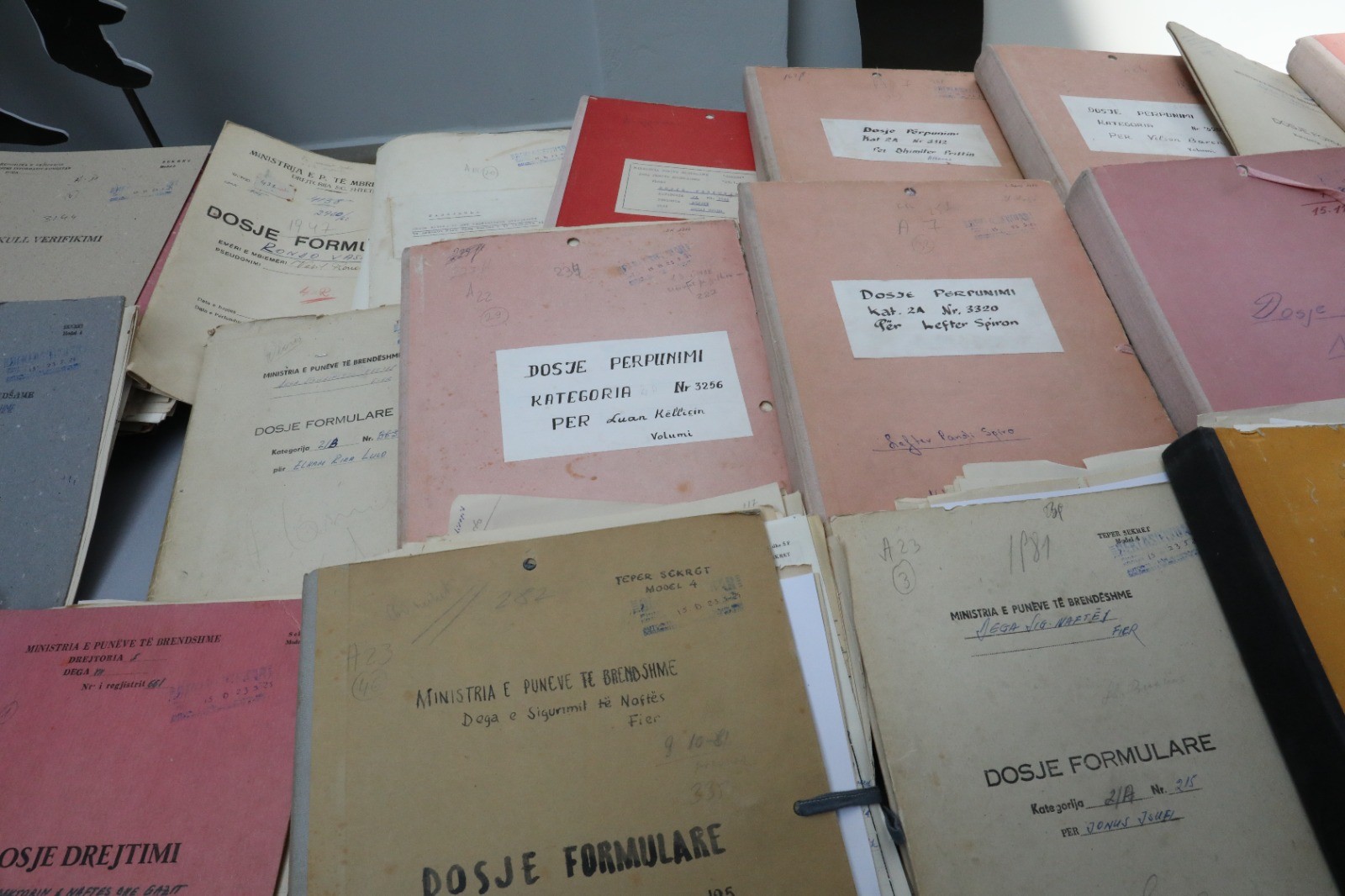
Chairwoman Sula: All this drama, all this ordeal of undeserved suffering. This human potential wasted from 1947 to 1990 deserves a monument in Fier, and this is a project we want to continue with the City Municipality and Albeptrol.
Tirana, July 3, 2024 – With the voice of the children of petroleum engineers, heroes of science and victims of the communist regime, the Authority for Information on the Documents of the Former State Security (AIDSSH) today opened the archival fund of the Oil Security branch and held the scientific symposium: “Exploration and Development of the Oil Sector under the Control of the State Security 1944-1991,” in cooperation with the Ministry of Infrastructure and Energy and the Faculty of Geology and Mining.
Researchers of history, economics, and jurisprudence, professors and petroleum engineers, eyewitnesses of the time, and family members presented facts and studies that shed light on the development of the oil sector in Albania during the period 1945–1991. They documented the repression by the Party of Labour against science, and the tragic fate of geologists and scientists such as Stanisllav Zuber, Riza Alizoti, Thoma Pojani, Filip Nashi, Beqir Alia, Koço Plaku, Protoko Murati, Milto Gjikopulli, Dhimitër Stefa, Jani Konomi, and Nuredin Skrapari, among others. They were accused of sabotaging the regime, agitation and propaganda, and destruction of public communal property. Some of them were sentenced to death and executed, and their bodies remain missing to this day.
The Chairwoman of the Authority, Dr. Gentiana Sula, stated: “Dictatorship without violence, ideology, and extreme politicization is unsustainable. But production without the human rights of the technical staff was also unsustainable. Through the opening of the documentary archives and their study by experts in history and geological science, we today make an irreplaceable contribution to shedding light on the dark corners of the State Security, which, through investigations, persecutions, and infamous executions, shamed every human conscience and caused a stagnation in the development of the oil sector in Albania.”
Jovan Plaku, the son of the executed engineer Koço Plaku, who remains missing to this day, said: “Today, I can say that all these files have genuine research value because they reveal not only the extent of the persecution but also fully expose the wickedness and perversity of the regime’s servants in carrying out this persecution. It could not have happened otherwise. The cruelty of the dictatorship as a regime can only be surpassed by another cruelty—the cruelty of the regime’s executioners, boundlessly inhuman and endlessly malicious.”
Agim Gjikopuli, son of the executed engineer Milto Gjikopulli, who remains missing, said: “The state should have apologized to our families, an apology to the destroyed people. It should be the state today that gives an account of where they are. For 34 years, together with Jovan, we have privately searched, we have been judged for searching privately. We have been arrested because we sought the remains of our parents.”
ChatGPT said: Dr. Alda Biçoku, Albanologist and daughter-in-law of Academic Prof. Teki Biçoku, shared historical facts from the work of the academic and his resistance in prison. He refused to testify at the trial of his minister, Koço Theodhosi. He was isolated for 18 months and sentenced to 20 years in prison. Her testimony enriches with facts the process concerning the missing persons who died in prisons: “As a clerk for the prison authorities, T. Biçoku recorded the names of those who died and secretly placed a small bottle containing their names next to their bodies. The bodies of the prisoners were not handed over to their families because even the deceased had to complete their sentences in the prison cemeteries. The aforementioned statistics and the names of the deceased in bottles were considered unauthorized actions, and therefore he was transferred to another prison.”
Painful childhood memories were also shared by Kozeta Bushati, daughter of Beqir Alia, who was sentenced in the trial against the petroleum engineers. The identity crisis and the need to understand her father’s guilt changed her life. Likewise, Nezi Alizoti, daughter of engineer Riza Alizoti, who was sentenced to death by hanging in 1947, recalled her father’s sacrifices to serve the country, despite having the opportunity to continue his career in England where he had studied.
Altin Hoxha, a member of AIDSSH, in his study on persecution statistics in the oil sector, presented previously unknown facts to the public: “The first confrontation of the State Security was with the Italian specialists who remained in Albania as former employees of the companies AIPA and AGIP, which exploited the oil concessions in Albania.”
More than 50 Italian specialists, stationed in Kuçovë and Tirana, were under the surveillance of the State Security and faced hatred and persecution from the newly established post-war structures representing the State Security. Some of them, such as petroleum engineers Andrea Taraskoni and Mario Cetti, were executed in 1945, while others, including Vicenso Andrizoni, Vitorio Profili, Aldo Cavalini, Don Plestro Scavalini, Antonio Meneguni, Nicola Achile, Otavio Benetti, and Lusi Maechisio, were arrested and imprisoned.
In 1946, Professor Venezio Lozi and Salvadore Gombia were sentenced to death as saboteurs and for illegal trade; engineer Ludoviko Petrasi was sentenced to 101 years in prison, Albero Agostinone to 20 years, and Antonio Demarkchis and Vicenzo Gallo each to 10 years. The main reason for their sentences was their attempt to return to their homeland.
Prof. Dr. Nevton Kodhelaj, from the Faculty of Geology and Mining, spoke about the development of the oil and gas extraction and processing sector in Albania, as well as the oppression exerted by the authorities against geologists.
Ilia Gjermani, representative of the Ministry of Infrastructure and Energy, in his presentation on the exploration and production of hydrocarbons in Albania, gave an overview of the history of this activity.
Dr. Ermal Frashëri said: “This symposium serves as a platform to continue studies on the oil sector. One of the ideas I would suggest is advancing research on the role oil has played in the Albanian economy, the way it developed as an industry, because there is much to learn from the memories of oil workers, engineers, and sector employees. There are many aspects to further explore regarding how the oil sector was governed and how it was established as a sector.”
Gerla Kotka, from AIDSSH, in her study on the persecution and sentencing of two petroleum engineers, Koço Plaku and Milto Gjikopulli, in the files of the former State Security, stated: “Despite the significant contributions of the engineers to the oil industry, they received the harshest and most unjust punishments from the system, which in its policymaking was focused on finding enemies among the most dedicated people of science and study.”
Jonel Hibo from AIDSSH, in his presentation on the activities of Stanislav Zuber, Riza Alizoti, Lipe Nashi, and Nuredin Skrapari as seen in the files of the former State Security, testified about the investigative methods used against them.
“All this drama, all this ordeal of undeserved suffering. This human potential wasted from 1947 to 1990 deserves a monument in Fier, and this is a project we want to continue with the City Municipality and Albeptrol.”
Meanwhile, we will further advance the work toward fulfilling the mission regarding the missing bodies by deciding to initiate administrative investigations for the remains of the missing engineers.
“We will do everything possible to conduct intensive searches aimed at finding these bodies, standing by the families in their right to have a resting place for their loved ones,” Chairwoman Sula said at the close of the meeting.
